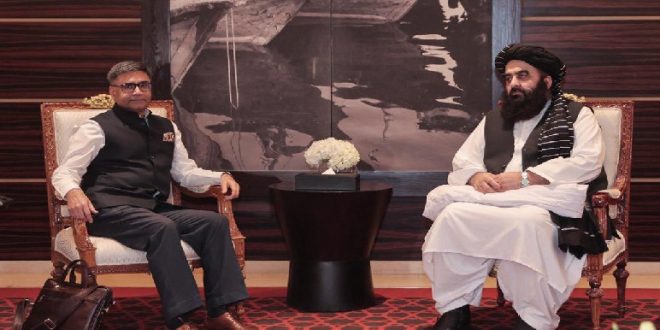13-01-2025
NEW DELHI/ KABUL: The meeting in Dubai between Indian Foreign Secretary Vikram Misri and Amir Khan Muttaqi, acting foreign minister of the Taliban, on Wednesday this week has confirmed India’s intentions to raise its influence with the Afghan leadership, analysts say.
India has been gradually upping relations with the Taliban over the past year but this latest meeting marked the first high-level engagement of its kind.
 India has invested more than $3bn in aid and reconstruction work in Afghanistan in the past 20 years and a statement from the Indian Ministry of External Affairs laid out the usual talking points: regional developments, trade and humanitarian cooperation plus an agreement to resume developmental projects and to support the health sector and refugees in Afghanistan.
India has invested more than $3bn in aid and reconstruction work in Afghanistan in the past 20 years and a statement from the Indian Ministry of External Affairs laid out the usual talking points: regional developments, trade and humanitarian cooperation plus an agreement to resume developmental projects and to support the health sector and refugees in Afghanistan.
However, it was what was left unsaid in that statement but which was evident from the timing and agenda of this meeting that signaled a shift in the geopolitical realities of the region.
For one, the meeting comes just days after India issued a condemnation of Pakistan’s air attacks on Afghanistan which have reportedly killed at least 46 people in the last month.
It also comes on the heels of the Taliban’s appointment of an acting consul in the Afghan consulate in Mumbai, in November last year.
While the Indian government did not comment on the appointment, the timing coincided with a visit by India’s joint secretary of the Ministry of External Affairs to Kabul the same month.
A strategic shift?
These recent events signal a deepening of ties between New Delhi and Kabul, observers say but the move may not be the strategic shift it appears, said Kabir Taneja, deputy director and fellow at the Observer Research Foundation, an Indian think tank. “It is just a natural progression of what has been India’s cautious and protracted approach to the Taliban’s reality in Kabul since 2021,” he said. “Much like other neighbours, for India as well the Taliban is a reality, and ignoring Afghanistan and the Afghan people is not an option.”
 Raghav Sharma, associate professor at the Jindal School of International Affairs in New Delhi, agreed. “I think this is a continuation of the earlier policy where we are sort of engaging with the Taliban, but we don’t really want to acknowledge the depth of our engagement,” he said, noting that policy has seldom emerged from such dialogues.
Raghav Sharma, associate professor at the Jindal School of International Affairs in New Delhi, agreed. “I think this is a continuation of the earlier policy where we are sort of engaging with the Taliban, but we don’t really want to acknowledge the depth of our engagement,” he said, noting that policy has seldom emerged from such dialogues.
Indian reluctance lingers
One positive move which may come out of all this, Taneja said, is the prospect of visas for Afghans. “The main takeaway from Misri-Muttaqi engagement is that India may be close to restarting a tranche of visas for Afghans, specifically in trade, health tourism and education,” he said.
Cautious steps or just a lack of strategy?
There are other reasons India may be reluctant to go further with the Taliban. Closer ties could put “the world’s largest democracy” in an ethical quagmire, say analysts.
“India has long tried to market and position itself as the largest democracy in the world, but has failed to even condemn the banning of girls’ education in Afghanistan. There has been absolute pin-drop silence on these issues. So what signal are we sending to the population back home?” Sharma asked.
India has maintained a strong presence in Afghanistan and was one of the first countries to send a diplomatic mission after the fall of the Taliban in 2001. (Al Jazeera)
 Pressmediaofindia
Pressmediaofindia




